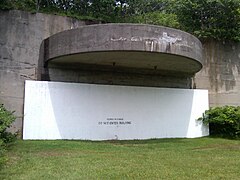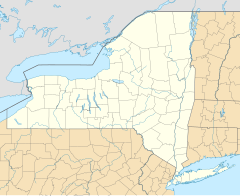Camp Hero
| Camp Hero State Park | |
|---|---|

Former gun emplacement at Camp Hero State Park
|
|
|
Location of Camp Hero State Park within New York State
|
|
| Type | State park |
| Location | 1898 Montauk Highway Montauk, New York |
| Nearest city | Montauk, New York |
| Coordinates | 41°04′14″N 71°52′16″W / 41.0706°N 71.8710°WCoordinates: 41°04′14″N 71°52′16″W / 41.0706°N 71.8710°W |
| Area | 754 acres (3.05 km2) |
| Created | 2002 |
| Operated by | New York State Office of Parks, Recreation and Historic Preservation |
| Visitors | 114,995 (in 2014) |
| Open | All year |
| Website | Camp Hero State Park |
Camp Hero State Park is a 754-acre (3.05 km2) state park located on Montauk Point, New York. The park occupies a portion of the former Montauk Air Force Station.
The site known as Camp Hero, or the Montauk Air Force Station, was originally commissioned by the U.S. Army in 1942. Camp Hero was originally a coastal defense station that was disguised as a fishing village, and its location was chosen to prevent a potential invasion of New York from the sea. Camp Hero was named after Major General Andrew Hero, Jr., who was the Army's Commander of coastal artillery, who died in 1942. Three gun batteries were built at Camp Hero, replacing most of the other heavy guns in the Harbor Defenses of Long Island Sound, which also included Fort H. G. Wright, Fort Michie, and Fort Terry. Two batteries of two 16-inch guns each were built, Batteries 112 and 113 (officially named Battery Dunn). Another battery of two 6-inch guns was also built, Battery 216. All three batteries consisted mainly of a large concrete bunker covered with earth, containing ammunition magazines and fire control equipment. The 16-inch guns were protected by large casemates, the 6-inch guns by shields.
In 1992, Preston Nichols and Peter Moon wrote The Montauk Project: Experiments in Time in which they alleged that secret experiments were carried out at the Camp Hero site. The book was popular with conspiracy theorists, and spawned several sequels.
In 1984, the General Services Administration attempted to sell the entire facility to real estate developers. Local environmental activists protested, claiming that the site had many unique ecosystems and animal habitats. The remaining portions of the military reservation at Montauk were decommissioned and most of the facility, including Camp Hero, was donated to the National Park Service, which then turned it over to the New York State Office of Parks, Recreation and Historic Preservation. Portions not deemed environmentally sensitive were sold off.
...
Wikipedia

